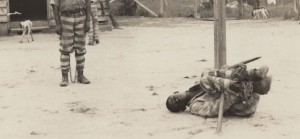“Casual Cruelty:” They Hate Our Children…
I was listening to my friend Emma on the radio yesterday morning. She was talking about the need to curtail suspensions, expulsions, and arrests in Chicago Public Schools. Toward the end of the segment, a man who identified himself as handling school discipline at Bowen High School in the 1990s, called in to say that he wanted Emma to clarify something: “Was he supposed to sit gang affiliated students down to talk with them about why they were doing what they were doing?” He wanted her to assure him that this was not what she meant when she was discussing the need for restorative practices to be adopted in public schools as an alternative to suspensions and arrests. Of course, his question was a rhetorical one. His point was that some young people who attend Chicago Public Schools deserve harsh treatment. Some of them, the ones he identified as “drug kingpins,” should be punished, dismissed, and removed from schools. You can listen to the interview here.
I’ve heard this man’s voice and seen his attitude for my entire life. It’s the voice of a prison guard who tells me that I am “naive” and that I don’t know that these prisoners are really “animals.” It’s the voice that seems to be reserved for black and brown young people in this country. Richard Wright described black people’s treatment at the hands of what he called the “Lords of the Land” as “casual cruelty.” The term has always resonated with me.
I know that there are in fact some young people attending Chicago Public Schools who are gang affiliated. I work with some of these youth. They are, however, by no means “drug kingpins” though. My friend Dara posted something on Facebook a couple of days ago that I think bears repeating. She made the point that while the lethal violence in some neighborhoods in Chicago was in fact real and unacceptably pervasive, “we HAVE to understand how state violence, mass incarceration, disenfranchisement and repression have been a precursor and intimately intertwined in so much of this violence.” Dara’s point, however, is lost on the man who called into the radio show. For him, some of our youth, those suspected to be gang members, deserve only punishment. Trying to understand the root causes of why they are involved in a gang at all would be a fool’s errand.
Dara beautifully articulated what I struggle to write about on this blog. I don’t condone the use of lethal violence and I don’t excuse it. Yet I think that we can only address this by understanding its root causes. Context, however, is met with impatience. People want easy and inexpensive solutions. But if we don’t properly define the terms then we will misdiagnose the problem and be unable to find the right cure.
 Reflecting on his childhood in captivity, Olaudah Equiano who was stolen from Africa at the age of 11 and brought to America, wrote:
Reflecting on his childhood in captivity, Olaudah Equiano who was stolen from Africa at the age of 11 and brought to America, wrote:
“When you make men slaves you deprive them of half their virtue, you set them in your own conduct an example of fraud, rapine, and cruelty, and compel them to live with you in a state of war.”
I think that we are currently making a whole class of people living behind bars as well as those living in the prisons of our inner cities into slaves compelling them to live with us in a state of war. This is not new, in fact it is as it ever has been…
Note: For those who are interested in the history of gangs in Chicago, don’t forget that Report to the Public, an exhibition about the Conservative Vice Lords is opening tomorrow evening at Art in These Times. Details can be found here.
